Mr. Rajesh Srinivasan, PhD student in the Department of Instrumentation and Applied Physics, has been selected for the prestigious Gandhian Young Technological Innovation Award (GYTI), 2020. The accolade is for the project to develop a cost-effective method to count CD4 cells and to tackle the HIV condition in rural parts of India.
CD4 (T-cell) count is important to determine HIV infection condition in an individual. Conventional techniques are expensive and could not be accessed in resource-limited regions. This project has been designed with a motive to develop a cost-effective method to count CD4 cells and to tackle the HIV condition in rural parts of India. Basic automated Haematology analyzers are commonly available in rural diagnostics labs. By utilizing the analyzer’s capability to count cells and combining our technology of target cell separation, it is possible to count CD4 cell levels with minimal handling procedure. The highlight of this work is the 3-step process diluting whole blood, incubating it with antibody conjugated SPIONs (superparamagnetic iron oxide nanoparticles) and analysis using the hematology analyzer. With these three simple steps, it is possible to determine the CD4 cells count to monitor HIV condition. This technique will create a significant impact in the society by reducing the deaths due to HIV and decrease the rate of new infections. The motivation for this project is to develop a low cost CD4 counting method for HIV infected patients in resource-limited settings like rural parts of India. The major element to reduce the cost of the test is eliminating the need for flow-cytometer. The next important part that is actually a frugal innovation is using the automated hematology analyzer (replacing the flow-cytometer with hematology analyzer). These hematology analyzers are a common clinical laboratory instrument, hence the total cost of the test reduces to less than 150 (INR) from the current testing cost of 2000(INR).
Mr. Sukanta Nandi, , Ph.D. student, Department: Instrumentation and Applied Physics, receives Dr. K. V. Rao Scientific Society Research Award in Physics. The 20th KVRSS Science Award event was held online on 16th September where Mr. Nandi was awarded the first prize in the Physics category. The award is presented by Dr. K.V. Rao Scientific Society, a non-profit organization with the head office stationed at Hyderabad, Telangana, India. The research awards are presented to young scientists (Research Scholars and Doctorates), below 30 years of age, from various branches of basic sciences every year. The award carries a cash award of Rs. 20,000/- only and a trophy for the winner and a cash award of Rs.10,000/- only and a trophy to the runners-up in each category- Chemistry, Physics, Biology, and Mathematics.
Title of presentation : Spray Coating of Two−Dimensional Suspended Film of Vanadium Oxide−Coated Carbon Nanotubes for Fabrication of a Large Volume Infrared Bolometer.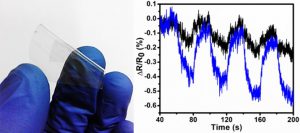 A vanadium oxide−coated multiwall carbon nanotubes (MWCNT) based suspended bolometer was fabricated by novel spray coating and transfer method. The obtained temperature coefficient of resistance of suspended bolometer was ~486% higher than that reported in the literature for WCNT bolometer. Suspension of the CNT film reduces thermal link with the environment and thus effectively improves the bolometric performance. The developed fabrication technique also allows to attain a thin continuous transparent film of CNT with more than 95% transparency in a wide optical spectrum at room temperature. Spray coating of nanometre scale thick film thus provides a versatile platform to bring highly tuneable device performance on any kind of transparent and flexible substrates.
A vanadium oxide−coated multiwall carbon nanotubes (MWCNT) based suspended bolometer was fabricated by novel spray coating and transfer method. The obtained temperature coefficient of resistance of suspended bolometer was ~486% higher than that reported in the literature for WCNT bolometer. Suspension of the CNT film reduces thermal link with the environment and thus effectively improves the bolometric performance. The developed fabrication technique also allows to attain a thin continuous transparent film of CNT with more than 95% transparency in a wide optical spectrum at room temperature. Spray coating of nanometre scale thick film thus provides a versatile platform to bring highly tuneable device performance on any kind of transparent and flexible substrates.
This work thus provides further insights into bolometric performance of MWCNT−based sprayed suspended bolometer. Further, the spray coating of such films together with the transfer technique opens avenues for developing high performing, large scale flexible devices.
Reference: Nandi, S. and Misra, A., 2019. Spray Coating of Two-Dimensional Suspended Film of Vanadium Oxide-Coated Carbon Nanotubes for Fabrication of a Large Volume Infrared Bolometer.ACS Applied Materials & Interfaces, 12(1), pp.1315-1321.
Link: https://pubs.acs.org/doi/full/10.1021/acsami.9b16608





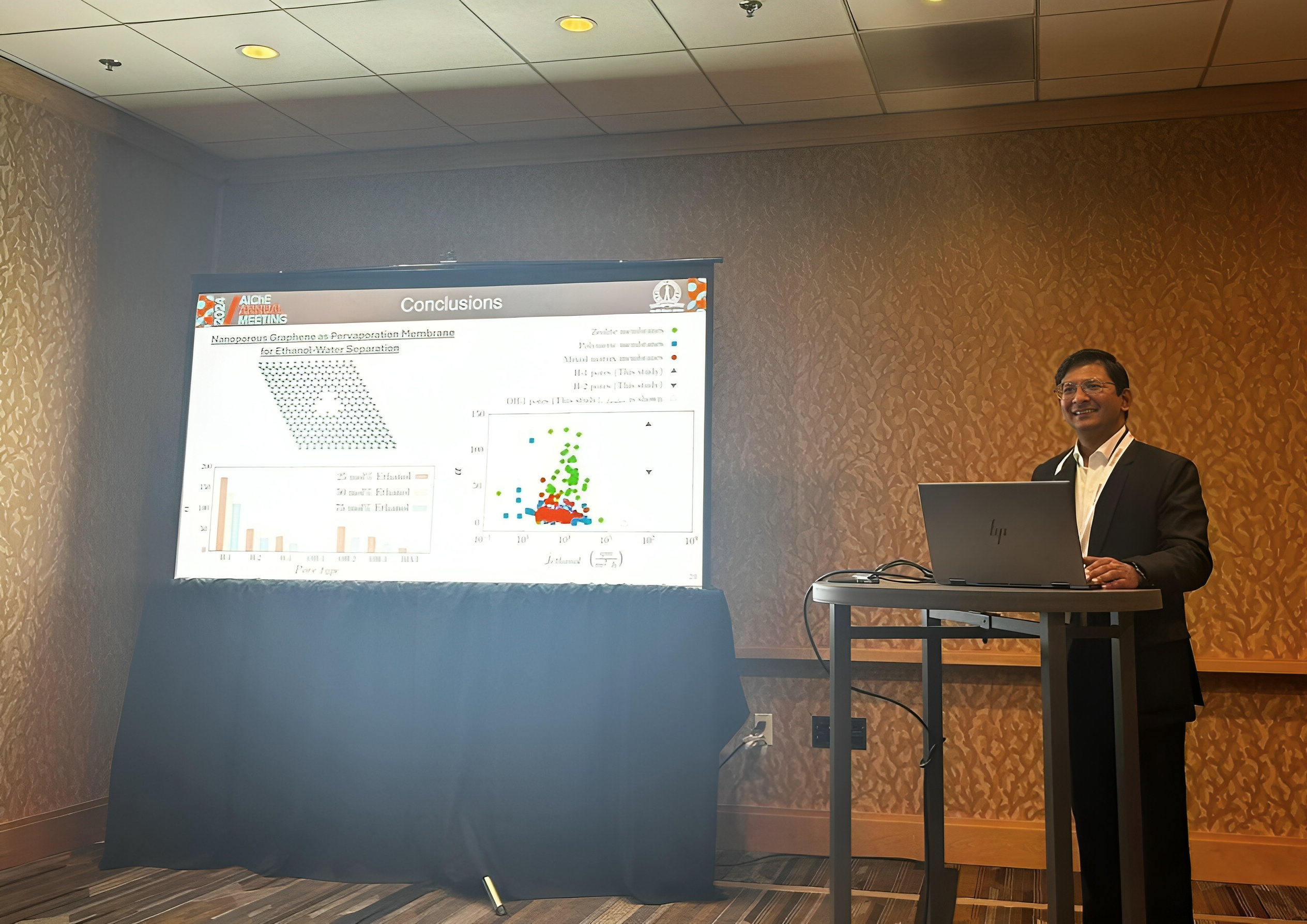
 Sruthi Sekar (advised by Bhavana Kanukurthi) has received an ACM India Doctoral Dissertation Honorable Mention for her dissertation titled “Near-Optimal Non-Malleable Codes and Leakage Resilient Secret Sharing Schemes”. Her dissertation makes fundamental contributions in our understanding of cryptographic primitives such as non-malleable codes, secret sharing schemes and randomness extractors. Sruthi’s doctoral dissertation work was done at Indian Institute of Science, Bangalore under the supervision of Bhavana Kanukurthi and Manjunath Krishnapur.
Sruthi Sekar (advised by Bhavana Kanukurthi) has received an ACM India Doctoral Dissertation Honorable Mention for her dissertation titled “Near-Optimal Non-Malleable Codes and Leakage Resilient Secret Sharing Schemes”. Her dissertation makes fundamental contributions in our understanding of cryptographic primitives such as non-malleable codes, secret sharing schemes and randomness extractors. Sruthi’s doctoral dissertation work was done at Indian Institute of Science, Bangalore under the supervision of Bhavana Kanukurthi and Manjunath Krishnapur. First Year BS (Research) student Shreenabh M Agrawal, receives of the Pradhan Mantri Rashtriya Bal Puraskar Award 2021.
Click
First Year BS (Research) student Shreenabh M Agrawal, receives of the Pradhan Mantri Rashtriya Bal Puraskar Award 2021.
Click  PhD student Prasenjit Ghosh gets 1st prize in Saransh – National Three-Minute-Thesis Competition for PhD students. In a world of fleeting attention spans, how do you communicate effectively? A typical PhD still takes about 5 years to complete. How do you communicate its thesis to a general audience in under 3 minutes? This is what the Indian National Young Academy of Sciences (INYAS) came up with. INYAS was founded by the INSA council in December 2014 with a vision to promote science education and networking among young scientists. Aptly named ‘Saransh’, the national-level competition was an opportunity for PhD candidates to talk about their research in under 3 minutes and 3 slides. ‘Saransh’ is an attempt to bridge the gap between budding scientists and the community at large. The finalists presented their talk to a jury of eminent academics and industry experts.
Click
PhD student Prasenjit Ghosh gets 1st prize in Saransh – National Three-Minute-Thesis Competition for PhD students. In a world of fleeting attention spans, how do you communicate effectively? A typical PhD still takes about 5 years to complete. How do you communicate its thesis to a general audience in under 3 minutes? This is what the Indian National Young Academy of Sciences (INYAS) came up with. INYAS was founded by the INSA council in December 2014 with a vision to promote science education and networking among young scientists. Aptly named ‘Saransh’, the national-level competition was an opportunity for PhD candidates to talk about their research in under 3 minutes and 3 slides. ‘Saransh’ is an attempt to bridge the gap between budding scientists and the community at large. The finalists presented their talk to a jury of eminent academics and industry experts.
Click  PhD Student Ritika Chaterjee has been awarded the Prestigious Prof. Saroj Chandrasekhar Memorial Award, 2022. This award is instituted by the Chandrasekhar Foundation in memory of Prof. Saroj Chandrasekhar, who has made a significant contribution to tuberculosis research. This is an annual award presented to three women Ph.D. candidates for their doctoral thesis work.
PhD Student Ritika Chaterjee has been awarded the Prestigious Prof. Saroj Chandrasekhar Memorial Award, 2022. This award is instituted by the Chandrasekhar Foundation in memory of Prof. Saroj Chandrasekhar, who has made a significant contribution to tuberculosis research. This is an annual award presented to three women Ph.D. candidates for their doctoral thesis work. PhD Student Pustam Raut from the Aerospace Engineering department, has been awarded the Hall of Fame & US$5,000 (₹3.75 lakh) by Google for his contributions to the safety and security of its Android ecosystem. He has discovered a High Severity bug/vulnerability and reported it to Google’s Android Security Team in 2021. Google’s Android Security Rewards (ASR) program has acknowledged his contributions on their Hall of Fame page. (Link:
PhD Student Pustam Raut from the Aerospace Engineering department, has been awarded the Hall of Fame & US$5,000 (₹3.75 lakh) by Google for his contributions to the safety and security of its Android ecosystem. He has discovered a High Severity bug/vulnerability and reported it to Google’s Android Security Team in 2021. Google’s Android Security Rewards (ASR) program has acknowledged his contributions on their Hall of Fame page. (Link:  Jagriti Singh, PhD student, CeNSE, receives Best Presentation Award, National Science Day (DST/STIN, Young Research Fellow)As part of Golden Jubilee Celebrations of Department of Science and Technology (DST), Government of India, Science, Technology and Innovation Talks (STIN 2021) by Young Research Fellows was being organized on National Science Day by International Advanced Research Centre for Powder Metallurgy & New Materials (ARCI), Hyderabad during February 25-26, 2021 on virtual platform. Young Research Fellows carrying out research in the field of Materials Science and Engineering participated in the national level competition and presented their work in the form of a presentation on their project/research work. Best presentation award was facilitated to Ms. Jagriti Singh, CeNSE, IISc, along with 2 other scholars. Her talk was entitled “The optical Wrestle: Why is black Silica better than black Si”
Jagriti Singh, PhD student, CeNSE, receives Best Presentation Award, National Science Day (DST/STIN, Young Research Fellow)As part of Golden Jubilee Celebrations of Department of Science and Technology (DST), Government of India, Science, Technology and Innovation Talks (STIN 2021) by Young Research Fellows was being organized on National Science Day by International Advanced Research Centre for Powder Metallurgy & New Materials (ARCI), Hyderabad during February 25-26, 2021 on virtual platform. Young Research Fellows carrying out research in the field of Materials Science and Engineering participated in the national level competition and presented their work in the form of a presentation on their project/research work. Best presentation award was facilitated to Ms. Jagriti Singh, CeNSE, IISc, along with 2 other scholars. Her talk was entitled “The optical Wrestle: Why is black Silica better than black Si” Kumari Sushmita, receives DST AWSAR “Awardees of Best Stories” under Ph.D. Category.
DST organizes AWSAR (Augmenting Writing Skills for Articulating Research) to popularize and unleash the spirit of science communication among young scientists and take the research happening within the laboratories to the general people.Ms. Kumari Sushmita’s popular science story, Polymer-based-hybrid Material as ‘Electromagnetic Kawach’, was selected as one of the best stories under the Ph.D. category. It is based on her Ph.D. research work at CeNSE, Indian Institute of Science, Bengaluru.
The recent surge in electronics usage has led to a new kind of problem, electromagnetic interference (EMI), which necessitates finding alternate materials that offer ease of processing, design flexibility, lightweight, and ease of embedding/integrating with existing systems. This story talks about mitigating EMI by developing robust shields (electromagnetic absorbers) using polycarbonate-based hybrid materials and its current challenges.
Kumari Sushmita, receives DST AWSAR “Awardees of Best Stories” under Ph.D. Category.
DST organizes AWSAR (Augmenting Writing Skills for Articulating Research) to popularize and unleash the spirit of science communication among young scientists and take the research happening within the laboratories to the general people.Ms. Kumari Sushmita’s popular science story, Polymer-based-hybrid Material as ‘Electromagnetic Kawach’, was selected as one of the best stories under the Ph.D. category. It is based on her Ph.D. research work at CeNSE, Indian Institute of Science, Bengaluru.
The recent surge in electronics usage has led to a new kind of problem, electromagnetic interference (EMI), which necessitates finding alternate materials that offer ease of processing, design flexibility, lightweight, and ease of embedding/integrating with existing systems. This story talks about mitigating EMI by developing robust shields (electromagnetic absorbers) using polycarbonate-based hybrid materials and its current challenges.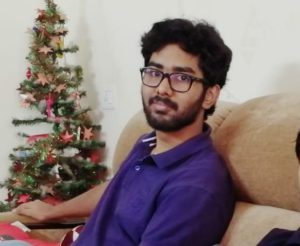 Pulkit Sinha gets second place in first ever Quantum Computing Challenge of the International Collegiate Programming Contest.
Pulkit Sinha gets second place in first ever Quantum Computing Challenge of the International Collegiate Programming Contest.
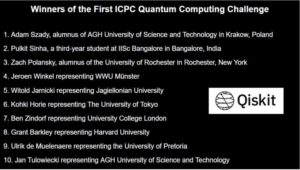 In the event, participants were tasked to design quantum circuits that output certain specific states. These corresponded to certain basic operations we would want to implement in a real quantum computer. The participants were ranked on basis of the score obtained, which was itself derived from the relative “costs” of the circuits. Here, “cost” was a number assigned to the circuits for which the formula was devised (by the organizers) to closely approximate the various inefficiencies, error rates, and additional resources consumed by the quantum circuit had it been run on an actual quantum computer. The goal for the participants was to make this specific cost as low as possible, which corresponded to making the respective circuits more efficient. To check whether the circuit was correct, all of them were checked through simulators. Click
In the event, participants were tasked to design quantum circuits that output certain specific states. These corresponded to certain basic operations we would want to implement in a real quantum computer. The participants were ranked on basis of the score obtained, which was itself derived from the relative “costs” of the circuits. Here, “cost” was a number assigned to the circuits for which the formula was devised (by the organizers) to closely approximate the various inefficiencies, error rates, and additional resources consumed by the quantum circuit had it been run on an actual quantum computer. The goal for the participants was to make this specific cost as low as possible, which corresponded to making the respective circuits more efficient. To check whether the circuit was correct, all of them were checked through simulators. Click 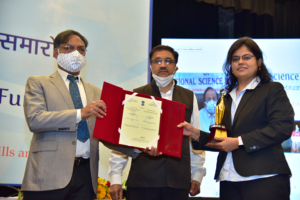 Ms. Shruti Soni, from Dr. Bhushan Toley’s group, has been awarded the DST-AWSAR award (third prize) in the Ph.D. category for writing a popular science story on her Ph.D. research work (Non-invasive, low-cost paper-based glucose detection using saliva as the sample). DST organizes AWSAR (Augmenting Writing Skills for Articulating Research) program to popularize and unleash the spirit of science communication among young scientists. Her popular science story titled “Pain-free way to manage your sugar rush” addresses an essential aspect of diabetes management that presently includes invasive and painful methods of monitoring blood sugar levels. The story suggests a more user-friendly diagnostic bodily fluid that can be collected in a non-invasive and pain-free manner and can be used to monitor glucose levels.
Ms. Shruti Soni, from Dr. Bhushan Toley’s group, has been awarded the DST-AWSAR award (third prize) in the Ph.D. category for writing a popular science story on her Ph.D. research work (Non-invasive, low-cost paper-based glucose detection using saliva as the sample). DST organizes AWSAR (Augmenting Writing Skills for Articulating Research) program to popularize and unleash the spirit of science communication among young scientists. Her popular science story titled “Pain-free way to manage your sugar rush” addresses an essential aspect of diabetes management that presently includes invasive and painful methods of monitoring blood sugar levels. The story suggests a more user-friendly diagnostic bodily fluid that can be collected in a non-invasive and pain-free manner and can be used to monitor glucose levels. A vanadium oxide−coated multiwall carbon nanotubes (MWCNT) based suspended bolometer was fabricated by novel spray coating and transfer method. The obtained temperature coefficient of resistance of suspended bolometer was ~486% higher than that reported in the literature for WCNT bolometer. Suspension of the CNT film reduces thermal link with the environment and thus effectively improves the bolometric performance. The developed fabrication technique also allows to attain a thin continuous transparent film of CNT with more than 95% transparency in a wide optical spectrum at room temperature. Spray coating of nanometre scale thick film thus provides a versatile platform to bring highly tuneable device performance on any kind of transparent and flexible substrates.
A vanadium oxide−coated multiwall carbon nanotubes (MWCNT) based suspended bolometer was fabricated by novel spray coating and transfer method. The obtained temperature coefficient of resistance of suspended bolometer was ~486% higher than that reported in the literature for WCNT bolometer. Suspension of the CNT film reduces thermal link with the environment and thus effectively improves the bolometric performance. The developed fabrication technique also allows to attain a thin continuous transparent film of CNT with more than 95% transparency in a wide optical spectrum at room temperature. Spray coating of nanometre scale thick film thus provides a versatile platform to bring highly tuneable device performance on any kind of transparent and flexible substrates.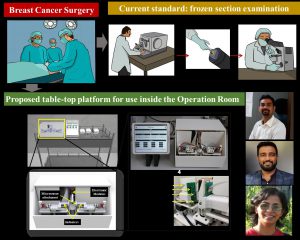 In the case of breast cancer surgery, the current protocol to assist the surgeon in determining surgical margin involves intra-operative frozen section examination which requires the surgically removed sample to be sent to the pathology lab. This process is time consuming, requires the expertise of a skilled personal (Oncopathologist), and further suffers from poor sample preparation leading to inconclusive diagnosis. To aid the surgeon and the oncopathologist in rapid diagnosis as well as surgical margin assessment inside the operation room, we have designed and developed a portable diagnostic platform. The platform is integrated with microchips, electronic modules, actuators, and firmware for control and data acquisition in a label-free manner. The electrical, thermal, and mechanical modalities of the breast biopsy tissues are measured and analyzed for delineating normal from cancer. After studying a large cohort of samples, the team envisages this platform to be used inside the operation room for rapid surgical margin assessment.A provisional patent for the invention has been filed at the Indian patent office.
In the case of breast cancer surgery, the current protocol to assist the surgeon in determining surgical margin involves intra-operative frozen section examination which requires the surgically removed sample to be sent to the pathology lab. This process is time consuming, requires the expertise of a skilled personal (Oncopathologist), and further suffers from poor sample preparation leading to inconclusive diagnosis. To aid the surgeon and the oncopathologist in rapid diagnosis as well as surgical margin assessment inside the operation room, we have designed and developed a portable diagnostic platform. The platform is integrated with microchips, electronic modules, actuators, and firmware for control and data acquisition in a label-free manner. The electrical, thermal, and mechanical modalities of the breast biopsy tissues are measured and analyzed for delineating normal from cancer. After studying a large cohort of samples, the team envisages this platform to be used inside the operation room for rapid surgical margin assessment.A provisional patent for the invention has been filed at the Indian patent office.